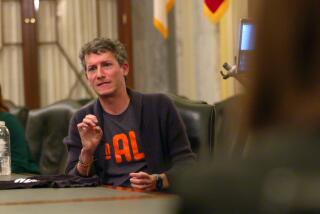HANDS ACROSS AMERICA: CAN KEN KRAGEN MAKE IT WORK?
In six months and a day, Ken Kragen and his USA for Africa Foundation plan to stretch a 4,000-mile human chain across the nation.
But, they learned the other day to their displeasure, it isn’t the first time for such an ambitious publicity stunt.
Hands Across America was tried before and--despite employing the same name, a year’s worth of planning and massive publicity--it failed. The best that organizer Marvin J. Rosenblum was able to muster for his grand patriotic gesture was a 10-mile line outside Chicago on July 4, 1976.
Kragen pleaded ignorance of the Rosenblum debacle when he first learned of it. The manager of such pop stars as Lionel Richie and Kenny Rogers told Calendar that he didn’t hear about it until a week after his own Oct. 22 announcement of the creation of a 1986 Hands Across America, scheduled to happen May 25, 1986. It’s designed to bring attention, and (hopefully) as much as $100 million in charitable contributions, to the plight of starving Americans.
Rosenblum, 43, a Chicago entrepreneur/attorney who invented the Spiro Agnew wristwatch, recalled his own failed attempt. “It was during the Bicentennial--back in the days of Tall Ships and red, white and blue fire hydrants.”
For a year leading up to Independence Day, 1976, Rosenblum said he did his level best to get about 4 million Americans to hold hands from Boston to Los Angeles. But he couldn’t get enough corporate sponsors or volunteers and the show flopped.
At first, Rosenblum--who boasts that he has “really terrific ideas every five years”--was not particularly contentious about USA for Africa’s project, even though he held the original trademark on “Hands Across America.” His claim to the name lapsed in 1977, according to a copyright search conducted by USA for Africa attorney Jay Cooper.
“I would be disappointed and probably outraged if they did it and I weren’t involved,” Rosenblum said a week ago.
But late Wednesday at Calendar press time, Rosenblum contacted Calendar to say that all negotiations with USA for Africa were off.
“I was shut out. I’m outraged,” he said.
He had felt that his five-year cycle on terrific ideas was about due. His last one came in 1980, when he bought the rights to George Orwell’s “1984” from Orwell’s widow, just in time to become executive producer of the 1984 film production of “1984,” starring John Hurt and the late Richard Burton.
He had thought his next terrific idea was somehow going to be linked to Kragen ever since he switched on a morning network news show the day after Kragen announced the newest USA for Africa show-biz event.
“I thought I was dreaming,” Rosenblum said. “There he was, standing there, giving exactly the same interview I gave 10 years ago on the old Dinah Shore show and to Tom Snyder. I just turned the TV off and went back to sleep. I knew it couldn’t be real.”
When he read it later the same day in the Chicago Tribune, Rosenblum realized it might be deja vu, but it was very real deja vu.
“I must have 4,000 or 5,000 news clippings about it,” he said, referring to press coverage of his own abortive hand-holding project in the nation’s newspapers (including The Times).
Though he contacted Kragen and made a bid to participate in the 1986 version of the 4,000-mile handshake, Rosenblum said he and Kragen couldn’t reach an agreement: “I think they can do it and conceptually I wish them well,” he said.
Rosenblum is reluctant to discuss any remedies--legal or otherwise--that he might be considering, but he openly questions the manner in which Kragen came up with his hand-holding plan.
At the time he was promoting his coast-to-coast human chain, Rosenblum had the endorsement of the federal Bicentennial Commission, headed by John Warner, the former Navy Secretary and U.S. Senator.
He saturated the press with publicity. Rosenblum says he finds it hard to believe that no one in the Kragen camp had remembered his 1976 project.
“He’s a very legitimate guy,” Kragen said. “He really did try it. But we had no idea it had been tried before. Not a single person in our outfit knew about it.”
Like the current Hands Across America, Rosenblum’s plan included sales of T-shirts and other logo-bearing souvenirs. Rosenblum still has T-shirts in most sizes, depicting two hands shaking over an outline of the contiguous 48 states. The USA for Africa version shows nine figures holding hands against a red, white and blue map of the U.S.
Though Rosenblum began his Hands campaign in August of 1975--almost a full year in advance--the best he was able to do was a couple “dry runs” of a few miles. On the Bicentennial Independence Day itself, his human chain managed to stretch only about 10 miles.
USA for Africa is trying to put its chain together in about half the time, but hopes to be 400 times as successful by using computers, satellite communications and lots of TV and print advertising to encourage Americans to participate.
The cost of undertaking the 1986 version is estimated at $18.8 million, much of which will be spent on commercials and promotions urging enough Americans to sign on to link up a human chain from New York to Los Angeles.
Coca-Cola already has agreed to underwrite a portion of that $18.8 million (neither Kragen nor Coca-Cola senior vice president Brian Dyson will reveal how much) and five other companies are being solicited to make up the difference in exchange for commercial name identity with the project.
The project already has added another office suite and four people to the growing USA for Africa staff, but the project’s manager insists that Hands Across America isn’t going to overburden USA for Africa with overhead.
“USA for Africa has always had a good history of keeping expenses low and we want to continue in that tradition,” said Fred Droz, a former Geraldine Ferraro and Jimmy Carter campaign worker who was hired about a month ago to head the Hands Across America subsidiary of USA for Africa.
With the hiring of Droz, USA for Africa’s much-publicized candor seems to have hit a snag.
USA for Africa executive director Marty Rogol has made a point of detailing precisely how much money the agency earns and spends, right down to his own salary of $62,000 a year. Droz has not been so forthcoming.
He said he would give no details on Hands Across America’s current costs and would not say how many people have signed up to stand in line since Kragen’s Oct. 22 announcement: “We’re not going to give out numbers until the end of the year,” Droz said.
He also would not give other details, including the amount of rent USA for Africa pays on the new Hands Across America headquarters office space, located four floors below the main USA for Africa offices in a Century City high-rise. A lease on the main 14th floor offices normally would run about $45,000 a year, according to Rogol, but USA for Africa gets them donated for free.
But Droz’s offices on the ninth floor aren’t donated--though he and his staff do get a reduction in rent, according to Rogol.
Kragen was contacted and said that as of the latest report, the project has only captured about 20 miles worth of Americans. According to USA for Africa estimates, each mile in the chain represents about 1,300 people. Pledges so far total about $550,000, he said.
Kragen has said that he hopes to get 6 to 8 million people to pledge between $50 million and $100 million over the next six months as a prerequisite to participating in the human chain. Sports, entertainment and political celebrities are joining in to make the pledging more attractive.
Kragen said the big difference between his human chain and Rosenblum’s is corporate backing. Coca-Cola, which signed on early as an underwriter, already has produced slick TV commercials that will begin airing soon.
Coke’s enthusiasm for the project can be traced to at least two Pepsi facts. First, Kragen’s premiere client and co-author of “We Are the World” is Lionel Richie--chief commercial spokesman for Pepsi this altruistic year. Second, Pepsi was one of four corporate sponsors of the hugely successful Live Aid concerts last July, again identifying Coca-Cola’s rival with the USA for Africa cause.
Rosenblum is at once envious and awed that Kragen was able to persuade the soft drink company to underwrite Hands Across America because he tried the same thing in 1975 and was politely spurned by Coke. Given the genesis of the USA for Africa version, Rosenblum said he wonders if his original request for a Coca-Cola subsidy didn’t eventually wind up being granted to Kragen 10 years later.
Kragen explained that the idea for the project was not his own. It came about this way, he told Calendar:
Last spring, during a specially choreographed performance of “We Are the World” performed by the New York City Ballet, he was sitting in the audience with New York advertising agency executive Jeff Nightengale.
Nightengale, who is with the firm of Burson Marsteller (which, Rosenblum is quick to point out, represents Coca-Cola), leaned over to Kragen and whispered the germ of an idea--why not stand 6 million people side-by-side across America in the greatest hand-holding link-up the world had ever seen?
More to Read
Sign up for Essential California
The most important California stories and recommendations in your inbox every morning.
You may occasionally receive promotional content from the Los Angeles Times.










